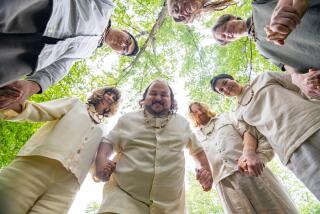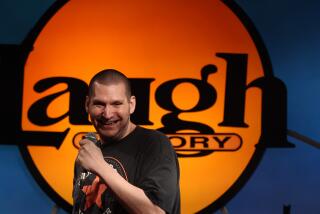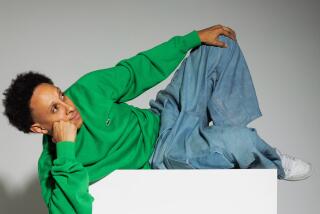Tiffany Haddish helps turn darkness into laughter at the Laugh Factory’s Comedy Camp
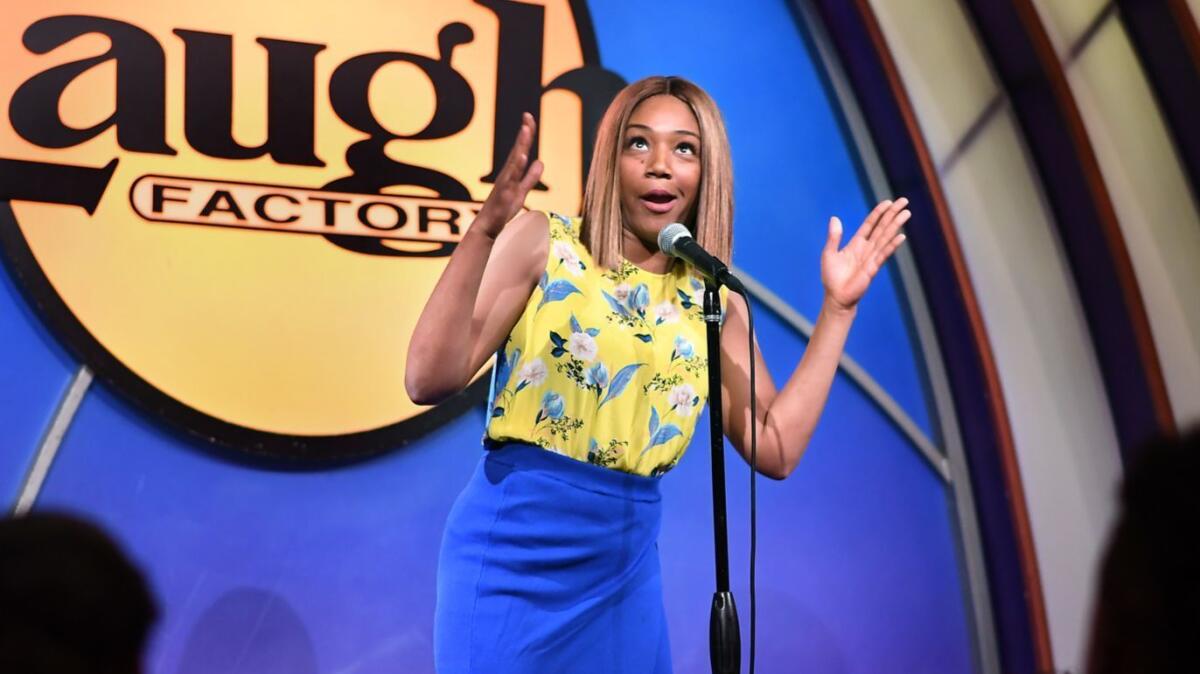
Just off Hollywood’s Sunset Strip, the Laugh Factory stands as one of the most durable pillars of the L.A. stand-up scene. Almost every night, large lines form under the club’s familiar round logo outside the cramped club. The enthusiastic, sometimes rowdy crowds jam into deep red leather booths or spindly tables and chairs to see up-and-coming talent or big names such as Tim Allen, Russell Peters and David Spade, who have all taken its stage this month.
But on a recent Saturday afternoon, the usually raucous atmosphere of the Laugh Factory is nowhere in evidence, the lights are turned up and the place is largely empty except for a young, attentive audience watching as 15-year-old Destiny Smith takes the stage in dark shorts and a black sweatshirt.
Destiny looks nervous, her eyes occasionally dipping to the floor, but she has a bright smile and her voice is steady as she mentions living in a group home, where there’s “a lot of negativity.” She talks about her job at a Girl Scout camp, which sounds difficult but often keeps her away from the drama of where she lives.
“Three people were arrested last night,” she says of her home, and the room falls still with concern. After a beat she adds with a sly grin, “I was happy for one of them.” Laughter ripples through the crowd as once again comedy is found within tension and release.
Welcome to comedy camp, where two-drink minimums are traded for wedges of watermelon, trays of cookies and a catered lunch. Clubs such as The Laugh Factory can be dark, vulnerable spaces where comics face unpredictable crowds that can be marked by hostile drunks or simple disinterest. But at this performance space, a little light comes in.
Established 34 years ago by club owner Jamie Masada, comedy camp invites some 30 children ages 9 to 16 to interview and audition for eight weeks of onstage experience and instruction from working comics. While the kids in every class are drawn from multiple cities around town and economic backgrounds, Masada has long placed a focus on helping kids who face deeper challenges than most, whether from the loss of a parent, a disability or other hardships.
The eight-week program culminates with a graduation this weekend and, no small extra detail, their first paycheck as performers — $100. The camp has drawn more attention in the last several months largely due to one of its graduates, Tiffany Haddish, who has become of Hollywood’s hottest stars thanks to her turn in “Girls Trip” and several other projects.
“What I believe is each time they do this, it gives them confidence,” says Masada during a lunch break from a recent session. “Laughter is such a healing thing. You talk about it, you laugh about it,” he adds.
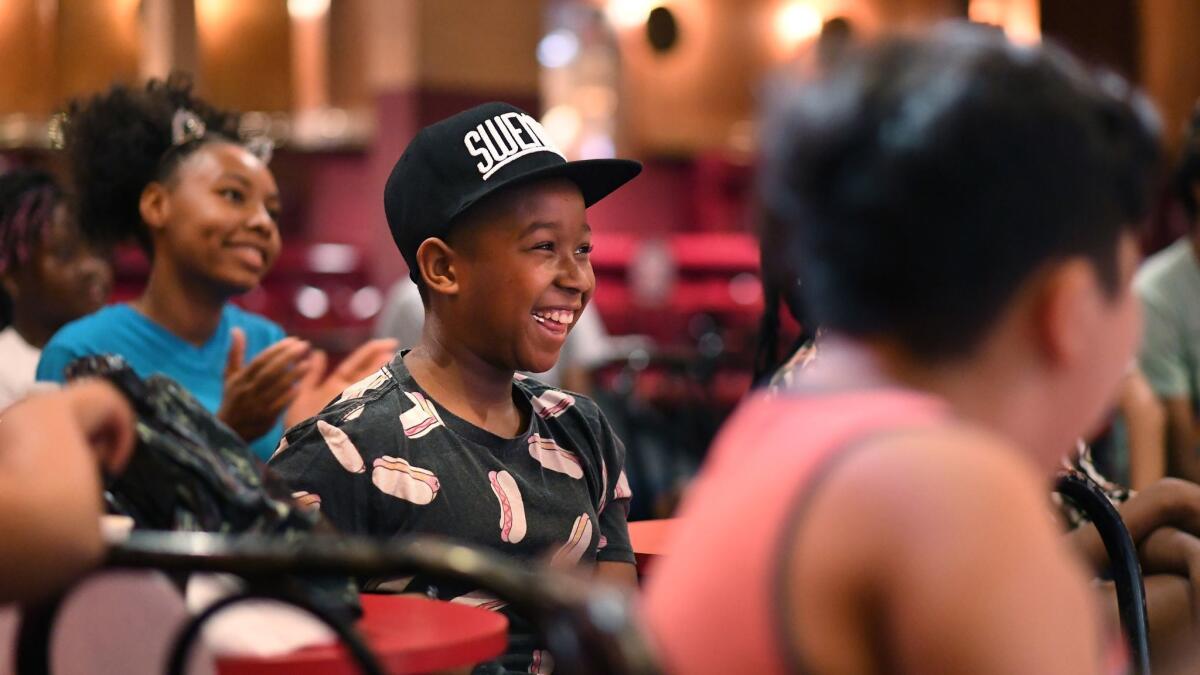
Seated in one of the horseshoe-shaped booths at the back of the club in a loose T-shirt and jeans, Masada is an engaged audience member, laughing when the jokes work and clapping the loudest from the back. He remembers former graduates who went from comedy camp to law school, medical school or — in Haddish’s case — international stardom.
Haddish was 15 and in a group home situation when she attended the camp, which then counted Dane Cook, Charles Fleischer and Richard Pryor among its mentors.
“[The camp] gave me a voice, you know? It was the first time I felt safe,” she said, speaking as she was headed to work on the TBS series “The Last O.G.” “It was the first time a man told me I was beautiful and I didn’t think anything bad was going to happen. People were listening, and I learned communication skills, how to write a joke. I learned a lot.”
Haddish returns to mentor new students every year, though that’s gotten harder as her schedule has become more demanding. On the day I visited, comic and star of Showtime’s “I’m Dying Up Here” Erik Griffin was alongside “United Shades of America” contributor Ron G, stand-up veteran Paul Rodriguez and Tehran Von Ghasri, a Laugh Factory regular who performs under his first name and has been a camp regular for the past seven years.
“A lot of the children go up and [the mentors] go, ‘Oh, they did a good job,’ but I realize, since I’ve been here, since the beginning, they did a great job,” Tehran says after class. “One person cried before they had to go onstage, one person refused to go on, one person would only specifically speak with their head down. And now you see these walls come down.”
After Destiny’s set, Griffin told her how much he appreciated her sharing her difficult experiences and turning them into comedy. “Does it help to just kind of let it out?” he asked her, holding a microphone at the side of the stage with a cluster of his fellow comic mentors.
“Uh, no,” she said softly, spurring another ripple of laughter from her classmates.
“That means you gotta keep doing it until it does,” Griffin went on. “I really was with you. I felt your frustration. That’s a hard thing to do.”
In true summer camp fashion, Tehran is something of the lead counselor under a black baseball hat with his name stitched across the front. At times he calls the crowd to attention while at others he engages them with mantras that instill a sense of discipline.
“Comedy is a team sport,” goes one, and later he invokes some of Haddish’s advice from an earlier class, saying, “Number one thing is, if you’re having fun, people will have fun with you,” which she later says was something she took from her time at camp.
“The things that are the most stressful to you or that bother you the most — maybe that’s what you should talk about,” Haddish remembers learning from Pryor, whose career unflinchingly reckoned with horrors from his personal life. “Because you’re not the only person that’s going through that, and, guaranteed, somebody’s going to be able to relate. And if you can find the funny in it, it’ll be easier to deal with.”
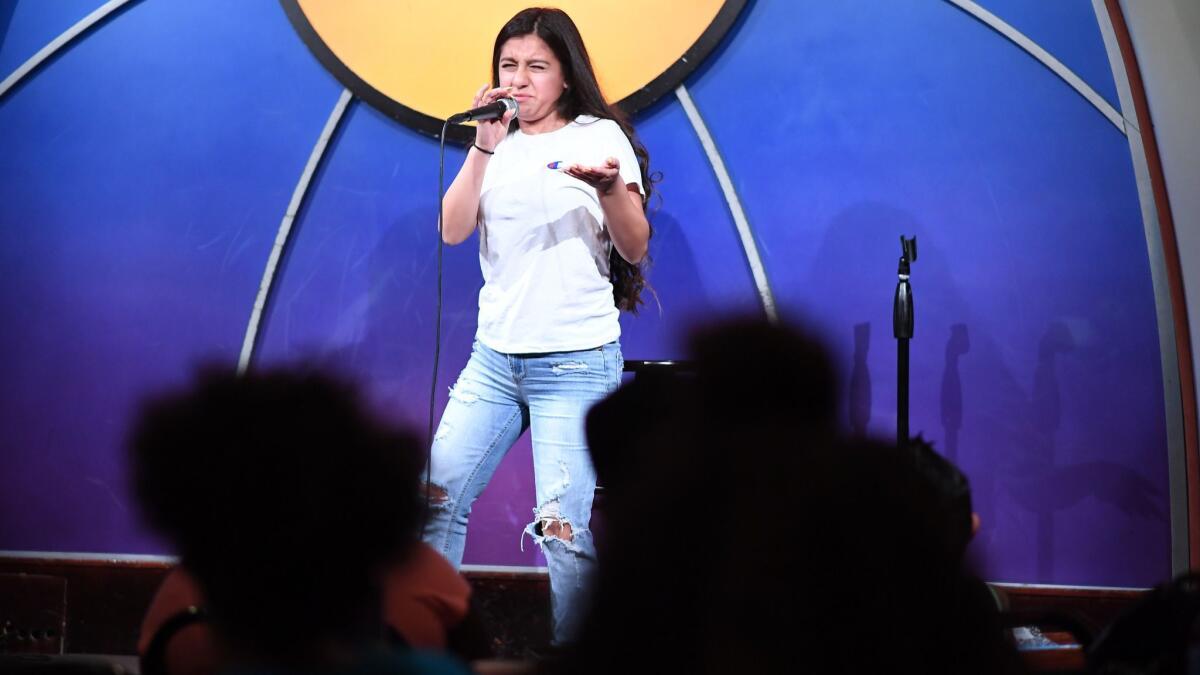
One student Tehran remembers as especially shy in the early going was 12-year-old Hanorah Liu from Redondo Beach. Tall, slim and wearing glasses and an oversized fleece top, she sat alone in the corner of the club for much of the class but onstage blossomed with a sly, dry delivery.
“When I grow up, I want to be a taxidermist, but the problem is I’m a vegetarian,” she says. After material about her parents and hometown, she points out her back brace with a playful knock against its frame. “Abs of steel,” she jokes.
“The fact that you’re telling your joke and you tapped on you back brace while you were talking? I think it’s so brilliant and strong and brave of you,” Ron G tells Hanorah after her performance. “Because a lot of us have hangups about who we are, but you’re so clear about who you are at your age, I’m so jealous. I see you doing some really dope stuff.”
Both from their classmates and the comics, the critiques of each set are uniformly positive, whether advising someone to take more time with their set-up or deliver or simple appreciation for when a joke lands. “You’re very lucky Carlos Mencia wasn’t here,” Rodriguez tells a boy from Orange County who riffed about Disneyland, a line he quickly admits was for his fellow comics.
“It’s rewarding. It’s just interesting to see how brave some of them are, how ready they are to do it,” Griffin says later. “I just look back at myself and I was never that ready.”
“I just get excited because I can see all the hope in their eyes,” says Ron G, who has a Comedy Central special in the works. “You can tell some of them have been through things, but I just want to share my energy and my lessons to teach them that you can have a real career doing this.”
While Hollywood dreams are common among the camp attendees, it’s far from the only goal for its mentors. “What we try to do is, we let them know that there’s really no rules for stand-up, that everything is fair,” said Rodriguez, who has been coming to the camp since its inception. “We try and emphasize to them that it’s not really a pathway to show business, it’s a pathway to freeing themselves and being able to speak in front an audience.
“Just conquering the stage, that fear of going up there, is really most valuable,” he added.
As the class goes on, attention in the crowd occasionally wanes, a natural result of bringing a group of kids together for a few hours of focus. Still, their commitment is obvious. A red crystal ceiling lamp that tells every Laugh Factory comic when their their set is up is always obeyed, and nerves left a few of them finishing ahead of schedule as they worked toward growing more comfortable with the spotlight.
Marcel Hall, a lanky and soft-spoken 15-year-old with short dreadlocks, appeared withdrawn yet jarringly honest as he took the stage with a simple “Hi. I’m Marcel. I’m a mess.” But with material that vividly brushed against discomfort with his family, religion or both, his voice came through loud and clear.
“People are always looking at me like I’m a future testimony,” he went on, describing a woman who tried to get him to go to church. “She’s like, ‘God can show you the light.’ And I’m like, ’Well, I’m fine with being in the very capable hands of gas and electric,’ ” he says. He then described her efforts to reach out to him but stopped himself, saying “I hate this joke,” before continuing with her attempt to rap. He might not have liked it, but the joke — a misdirection on a bad word — worked.
“How you feel?” Griffin asked after his set.
“I’m screaming internally right now because you’re like one of my favorite comedians,” he replied, his voice low. A few of the comics clapped for both of them.
See the most-read stories in Entertainment this hour »
After the room quieted, Griffin compared him with Jerrod Carmichael and encouraged the class to fight through a natural awareness of repeating yourself onstage. “Even though we’re talking this pain we feel sometimes, or our mom annoys us . . . all the things that you guys are talking about, when we get on that stage, we’re entertainers,” he says.
“Remember that, because the pain that you feel, you’re going to take it away from someone else and they’re going to leave here going, ‘I feel good because of what that guy talked about,’” Griffin says.
After the critique, Rodriguez encouraged Marcel to meet Griffin, and the two hugged at the side of the stage, a quick moment between fan and TV star, comic and peer.
Then it was time for the next act, and everyone else in the room, to feel good.
Follow me over here @chrisbarton.
ALSO:
Bobcat Goldthwait stays true to his roots with TruTV’s new anthology series ‘Misfits & Monsters’
Jon Stewart defends Samantha Bee in return to stand-up at San Francisco’s Clusterfest
The Trump era may have raised the stakes, but Clusterfest (and comedy) goes on
More to Read
The complete guide to home viewing
Get Screen Gab for everything about the TV shows and streaming movies everyone’s talking about.
You may occasionally receive promotional content from the Los Angeles Times.
